Related Research Articles

Curtis Lester Patrick was a Canadian professional ice hockey player and coach associated with the Victoria Aristocrats/Cougars of the Pacific Coast Hockey Association, and the New York Rangers of the National Hockey League (NHL). Along with his brother Frank Patrick and father Joseph Patrick, he founded the PCHA and helped develop several rules for the game of hockey. Patrick won the Stanley Cup six times as a player, coach and manager.
The Pacific Coast Hockey Association (PCHA) was a professional ice hockey league in western Canada and the western United States, which operated from 1911 to 1924 when it then merged with the Western Canada Hockey League (WCHL). The PCHA was considered to be a major league of ice hockey and was important in the development of the sport of professional ice hockey through its innovations.
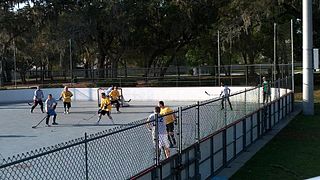
Street hockey is a collection of team sport variants played outdoors either on foot or with wheeled skates, using either a ball or puck designed for play on flat, dry surfaces. The object of every game is to score more goals than the opposing team by shooting the ball or puck into the opposing team's net. All games are derivatives of either the sport of ice hockey, floor hockey, bandy, and/or field hockey.

An exhibition game is a sporting event whose prize money and impact on the player's or the team's rankings is either zero or otherwise greatly reduced. Exhibition games often serve as 'warm up matches', particularly in many team sports where these games help coaches and managers select and condition players, before the competitive matches of a league season or tournament. If the players usually play in different teams in other leagues, exhibition games offer an opportunity for the players to learn to work with each other. The games can be held between separate teams or between parts of the same team.
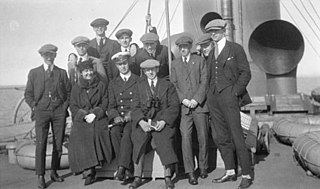
Ice hockey was introduced to the Olympic Games at the 1920 Summer Olympics in Antwerp. The tournament also served as the first World Championships. The matches were played between April 23 and April 29, 1920. Canada, represented by the Winnipeg Falcons, won the gold medal. The silver went to the United States and Czechoslovakia took the bronze.

The Toronto St. Michael's Majors were a major junior ice hockey team in the Ontario Hockey League, based in Toronto, Ontario, Canada. The most recent franchise was revived on August 15, 1996. In 2007, the team relocated to Mississauga, Ontario and became the Mississauga St. Michael's Majors until 2012. The hockey program was founded and operated by St. Michael's College School in 1906, and adopted the name "Majors" in 1934, and was commonly referred to as St. Mike's Majors.
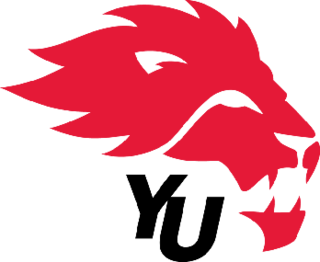
The York Lions is the official name for the athletic varsity teams that represent York University in Toronto, Ontario, Canada. The university's varsity teams compete in the Ontario University Athletics conference of U Sports and, where applicable, in the east division. The Lion's logo features a red lion from the school's logo with the university's colours, red and white.

Father David William Bauer was a Canadian ice hockey player and coach, educator and Catholic priest. He was offered a playing contract by the Boston Bruins at age 15, but declined on the advice of his father to complete a proper education. The experience of not pursuing his dream of playing professional hockey was traumatic for Bauer, who then committed himself to look for more meaning in life and play a role in world peace. After he served as captain of the Toronto St. Michael's Majors for two seasons and won the 1944 Memorial Cup, he became ordained as a Catholic priest in the Congregation of St. Basil and taught at St. Michael's College School. He coached multiple levels of hockey at St. Michael's, sat on the junior ice hockey council for the Ontario Hockey Association, lobbied for a shortened playing schedule for students athletes, and coached the St. Michael's Majors to victory in the 1961 Memorial Cup. Bauer was reassigned to St. Mark's College at the University of British Columbia (UBC) in 1961, then coached the UBC Thunderbirds for two seasons and led them to the finals at the 1963 CIAU University Cup.

Walter Gretzky, was a Canadian philanthropist who was best known as the father of Canadian ice hockey icon Wayne Gretzky.
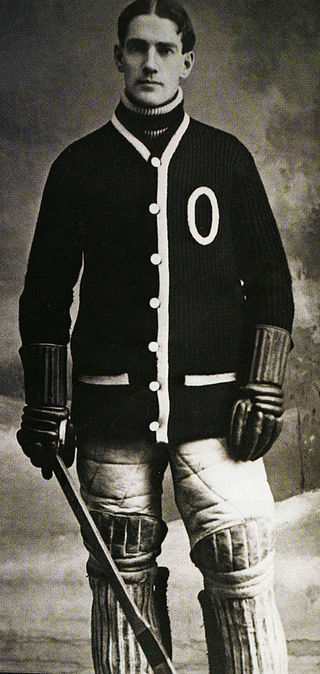
Percivale St-Helier LeSueur, known as "Peerless Percy", was a Canadian senior and professional ice hockey goaltender and later involved in the game as referee, coach, manager and owner. He was a member of the Smiths Falls Seniors for three years, with whom his performance in a 1906 Stanley Cup challenge series attracted the attention of his opponents, the Ottawa Silver Seven. Although his team lost the series, LeSueur excelled in goal, keeping the games close. Nine days after the defeat, he joined the Silver Seven and played in a challenge match against the Montreal Wanderers. He remained with Ottawa through the 1913–14 season where he served as team captain for three seasons, and assumed coaching duties in his final season with the team.

Frederick Wellington "Cyclone" Taylor, MBE was a Canadian professional ice hockey player and civil servant. A cover-point and rover, he played professionally from 1906 to 1922 for several teams, and is most well-known for his time with the Vancouver Millionaires of the Pacific Coast Hockey Association (PCHA). Acknowledged as one of the first stars of the professional era of hockey, Taylor was recognized during his career as one of the fastest skaters and most prolific scorers, winning five scoring championships in the PCHA. He also won the Stanley Cup twice, with Ottawa in 1909 and Vancouver in 1915, and was inducted into the Hockey Hall of Fame in 1947.

Francis Alexis Patrick was a Canadian professional ice hockey player, head coach, manager, and executive. Along with his brother Lester, he founded the Pacific Coast Hockey Association (PCHA), the first major professional hockey league in Western Canada. Patrick, who also served as president of the league, took control of the Vancouver Millionaires, serving as a player, coach, and manager of the team. It was in the PCHA that Patrick would introduce many innovations to hockey that remain today, including the blue line, the penalty shot, and tracking assists, among others.

Fr. Leslie John Thomas Costello was a Canadian ice hockey player and Catholic priest.
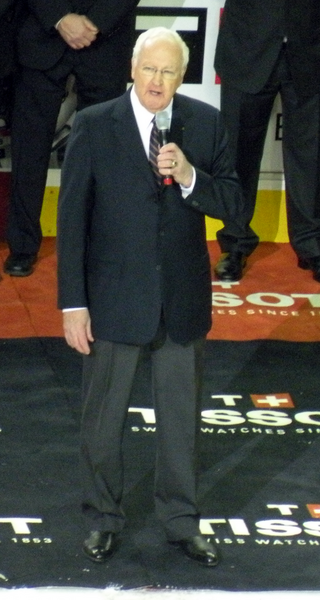
James Murray Costello is a Canadian retired ice hockey player, executive and administrator who dedicated a lifetime to the advancement of ice hockey in Canada. He played four seasons in the National Hockey League, and was the younger brother of Les Costello. He was a lawyer by trade, and was president of the Canadian Amateur Hockey Association from 1979 to 1994, then and its successor Hockey Canada from 1994 to 1998, when he facilitated the merger of the two organizations.

The Toronto Varsity Blues men's ice hockey team is an ice hockey team operated by the Varsity Blues athletics program of the University of Toronto. They are members of the Ontario University Athletics conference and compete in U Sports. The Varsity Blues senior team won the Allan Cup in 1921 and 1927, and won the gold medal for Canada at the 1928 Winter Olympics. The team is based at Varsity Arena on the University downtown campus in Toronto, Ontario.
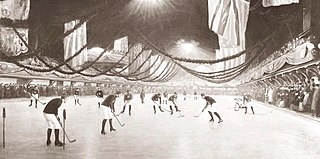
On March 3, 1875, the first recorded indoor ice hockey game took place at the Victoria Skating Rink in Montreal, Quebec. Organized by James Creighton, who captained one of the teams, the game was between two nine-member teams, using a rubber "puck". Members used skates and sticks used for outdoor hockey and shinny games in Nova Scotia, where Creighton was born and raised. It is recognized as the first organized ice hockey game.

Sylvester Patrick "Silver" Quilty was a Canadian football player, referee, coach and sport administrator. As a player, he won the Yates Cup in 1907 with the Ottawa Gee-Gees football team, and was credited as the first man to play the flying wing position. He also played with the Ottawa Rough Riders, and the McGill Redmen football team. After his playing career, he became a football referee and officiated the 10th Grey Cup, and also coached the Ottawa Rough Riders.

The first instances of organized women's ice hockey in Canada date back to the 1890s when it was played at the university level. The Women's Hockey Association claims that the city of Ottawa, Ontario hosted the first game in 1891. In 1920, Lady Meredith, an avid sportswoman and wife of Sir Vincent Meredith of Montreal donated the Lady Meredith Cup to the Quebec Ladies' Hockey Association, said to be the first women's ice hockey trophy created for a competition in Canada. At the time women competed in ankle-length skirts.

Darnell Nurse is a Canadian professional ice hockey defenceman and alternate captain for the Edmonton Oilers of the National Hockey League (NHL). Nurse was selected by the Oilers seventh overall in the 2013 NHL Entry Draft.

Ice hockey, simply referred to as "hockey" in both English and French in Canada, dates back to the 19th century. The sport is very popular and played year-round and at every level in the country. Born of various influences from stick-and-ball games brought from the United Kingdom and indigenous games, the contemporary sport of ice hockey originated in Montreal. It is the official national winter sport of Canada. Hockey is widely considered Canada's national pastime, with high levels of participation by children, men, and women at various levels of competition.
References
- 1 2 3 4 5 6 7 8 9 Given, Karen (14 February 2020). "'Praying And Playing': The Story Of The Flying Fathers". WBUR. Archived from the original on 6 May 2021. Retrieved 24 March 2021.
- 1 2 "Costello dies from injury at charity hockey game". ESPN. 16 December 2002. Retrieved 30 March 2021.
- ↑ "Former Maple Leaf led Flying Fathers". The Globe and Mail . 11 December 2002. Retrieved 23 March 2021.
- 1 2 3 4 Hoegler, Meggie (10 January 2018). "Flying Fathers: Next generation of hockey priests ready to hit the ice". The Catholic Register . Retrieved 23 March 2021.
- ↑ MacGregor, Roy (29 June 2018). "The Flying Fathers: How a group of Catholic priests playing hockey – and having fun – became an international sensation". The Globe and Mail. Archived from the original on 27 January 2021. Retrieved 24 March 2021.
- 1 2 "The Flying Fathers, bless 'em, are going by the boards". Chicago Tribune . 17 July 1987. Retrieved 23 March 2021.
- 1 2 3 4 5 6 7 Ehrkamp, Andrew (7 March 2019). "Next generation of Flying Fathers hits the ice with a mission". Catholic Alberta. Grandin Media. Archived from the original on 5 December 2020. Retrieved 24 March 2021.
- ↑ Rush, Curtis (18 February 2019). "In Canada, a hockey revival". The New York Times . Archived from the original on 11 April 2019. Retrieved 11 April 2019.
- ↑ "Father John MacPherson joining the Flying Fathers in Ennismore on Jan. 29". Peterborough Examiner . 21 January 2018. Retrieved 23 March 2021.
- ↑ "Knights earn an assist for Flying Fathers". The Catholic Register . 1 March 2020.
- ↑ "Flying Father hockey star dies of cancer". CBC News. 16 January 2006. Retrieved 23 March 2021.